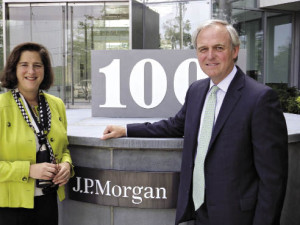Wealth management’s double-digit surge
JPMorgan Chase”™s books are the stuff of nationhood ”“ measured in the trillions.
Within that giant, JP Morgan Private Bank in Greenwich is among its top 10 wealth-management offices. If there”™s a No. 1, the Greenwich office”™s managing directors weren”™t saying on a recent afternoon in their 100 W. Putnam Ave. offices. The clientele appear satisfied with the service, No. 1 status notwithstanding, notching double-digit client and revenue gains across the last five years.
Its clients are most often first- and second-generation holders of at least $5 million in liquidity. “It pretty much shoots the image of money remaining in families across many generations,” said Townsend C. Smith, managing director.
“We represent many successful business owners and entities: asset managers, private equity, small brokers, brick-and-mortar businesses, shipping, widgets, distribution. Westchester is similar to Connecticut, but Connecticut has a preponderance of hedge funds.”

The office inevitably benefits from proximity to 30 percent of the world”™s hedge funds, but it”™s a tough audience to please ”“ “super-sophisticated” was the term used by Caroline Brecker, managing director. Farther north toward Hartford, she sees “a more Midwest style, salt-of-the-earth, manufacturing-based” clientele. And across the border in Westchester County, again, “super-sophisticated.”
JPMorgan staffs an “advice lab” in Manhattan to chart regulations and laws. “They produce a lot of white papers and they host breakfasts with intermediaries ”“ CPAs, lawyers, advisers ”“ on the changes,” Smith said. “They in turn take it to our clients.”
“It”™s a very knowledgeable clientele,” said Brecker. “High touch, quick follow-ups, a premium on time. We are their translator for what has become a more complex asset management environment.”
It is also, Brecker said, a new world where women have gained trillions relative to men in recent years ”“ the result of achievement, divorce settlements and living longer. “Stylistically, they manage their finances differently,” she said. “We have senior women here who recognize that.” Brecker herself has 16 years with the company (Smith has 21 years). She noted a female, Mary Erdoes, is CEO of JPMorgan”™s Asset Management Division, based in Manhattan.
Change has come in another arena, too: philanthropy. Brecker said the desire to give “remains strong in people.” But: “They want to see where the money goes, to know what it does. And if it is not bringing results, they want it out of there.” Medical and education causes are the two largest recipients of largesse.
Smith parsed the richer-than-thou differences between leafy Westchester and modestly leafier Greenwich: “A few more billionaires in Connecticut.” And he noted via diagram that no matter how eagerly a wealthy person spends, “even the superwealthy,” he or she likely reaches a point where buying is not the point. Smith and Brecker and their team of 76, 45 of whom work face-to-face as client advisers, engage such customers in a highly customized effort to spread the wealth laterally and into the future, with the IRS playing the diagram”™s financial antagonist.
Some clients keep a heavy hand in their portfolio. Some are hands-off. Some are hands-on and hands-off at the same time, managing higher-yield portfolios day-to-day and socking away for the future in long-term, hands-off products.
Yet for all the high-touch, custom service, if there is a rising tide all ships should be ready to rise. So the company prepares a “tactical asset allocations” report weekly. “Our clients want the views of JP Morgan,” Smith said. “They don”™t want to be in a lottery of different advisers all offering different advice. It reduces risk. It”™s another set of eyes.”
Internally updated reports offer high-, moderate-, and conservative-yield portfolio data. From there, some rely on JP Morgan”™s discretion; others use the company as a broker to execute trades of their own design. The bank allows the client to take a hand assembling his or her own management team. “Investment relationships develop,” Smith said. “A client might say, ”˜I want complete control, but with input from this or that adviser.”™”
Smith counted several examples of JPMorgan presaging a market move, the sort of foresight that leads to double-digit growth through tough times. “It”™s nice to be at a firm at the forefront of a trend,” he said.